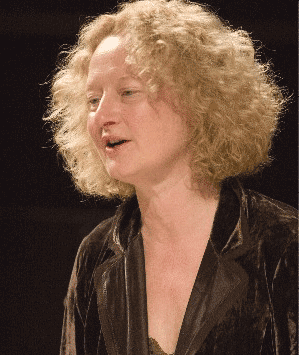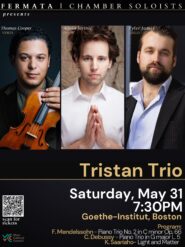Boston Camerata explores seasonal reverence and revelry across three centuries
For many listeners, music from the Middle Ages is more mysterious than emotionally palpable. Yet some scholars and performers find methods to interpret it in new and exciting ways.
In the hands of the Boston Camerata—founded in 1954 and one of the world’s oldest early music organizations—this repertoire expresses both the religious reverence and revelry of a bygone era with the immediacy of a modern spectacle.
In the Camerata’s thoughtful Christmas program entitled “Puer Natus Est,” heard Friday night at the Hancock United Church of Christ in Lexington, three centuries of music revived the spiritual joy in what has become a heavily commercialized season.
Over her decade as artistic director of the group, Anne Azéma has expanded upon programs originally conceived by Joel Cohen, who led the ensemble from 1969 to 2008. “Puer Natus Est” reimagines the former director’s popular 1974 “Medieval Christmas” concert (and recording from the following year) by introducing songs from Spain, Aquitaine, Italy, Germany, and England. The results were thoroughly refreshing and charming.
Reconstructing music from this time period requires meticulous research, a little guesswork, and plenty of imagination. Manuscript sources do not specify instrumentation and the musical notation is often vague.
Azéma has taken a wonderfully inventive approach to this music. The chansons, motets, and chants on Friday’s program involved simple but colorful instrumental accompaniments, and each tune, whether simple or complex, was spiced with the driving rhythms of medieval dance.
Some selections, such as the Gregorian “Dominus veniet,” were declamatory, the anonymous composers more focused upon text than flowering line. But the richest music of the evening could be heard in the chants from Aquitaine. The melodies of “Adest Sponsus” arched and coiled over cooing bagpipe descants, played with conviction by Christa Patton. Azéma’s trickling melismas in “Oiet Virgines” added urgency to a song that foretold the coming of Christ as the Bridegroom.
Other works combined instruments and voices for zesty arrangements. “Santa Maria, strella do dia,” a tune praising the Virgin Mary attributed to King Alfonso X (known as el Sabio), intertwined its verses with shawm and vielle, which Patton and Allison Monroe respectively rendered with toe-tapping verve.
Throughout the evening, the singing was pristine and idiomatically tasteful. Azéma, with her bright soprano, shaded the Hebrew cantillation “Kee yeled yolad lanu” and other airs with subtle grace notes and vocal shakes. Deborah Rentz-Moore’s dark alto brought gravity to a number of chants. The Gregorian “Judea et Jerusalem” sounded with the intimacy of a personal prayer, and her performance of the Dutch hymn “Jhesus ist een kyndeken” had the warmth of a lullaby. Soprano Camila Parias lofted gleaming melodies over Azéma’s and Rentz-Moore’s radiant voices in “Judicii signum,” her phrases coming to rest on perfectly tuned fifths and octaves.
Together, the singers mined the drama from el Sabio’s “Pois que dos reys nostre Senhor,” which conveyed the travels of the Magi and Herod’s deception. The Aquitanian vocal trio “Lux refulget” coursed with energy, and even the English double-texted motet “Sancta Maria graciae/ Dou way, Robin” was shaped with terpsichorean swagger.
Patton, performing on various winds and harp, joined forces with Monroe to support the vocal numbers with sensitive and tuneful accompaniment. Instrumental interludes, such as the German “Joseph, lieber Joseph mein” and the old English “Stanpipes,” set a rustic mood for the telling of the Christmas story in the concert’s second half.
The humility of the nativity scene resonated powerfully in the finale, the anonymous “Gregis pastor” from the 12th century. Its rapturous strains told of a shepherd who, though an “ass himself,” invites listeners to a rich feast. Holiday celebrations, Boston Camerata reminded the audience, are open to people from all walks of life.
The program will be repeated 8 p.m. Saturday at the First Religious Society UU in Newburyport and 3 p.m. and 5 p.m. Sunday at Gordon Chapel in Boston’s Old South Church. bostoncamerata.org
Posted in Performances

